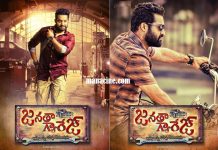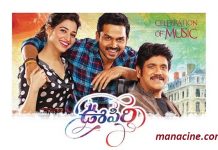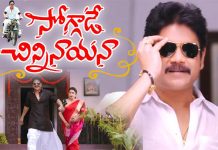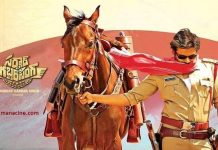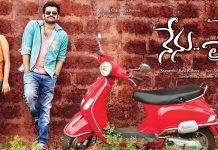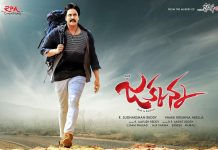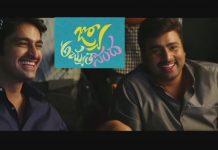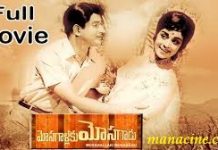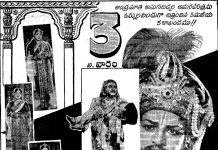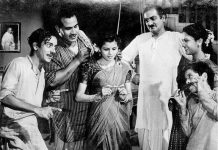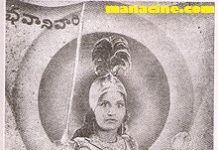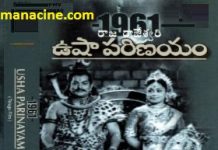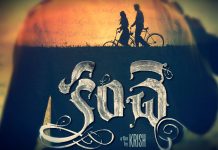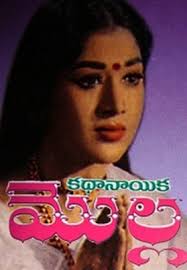 Kathanayika Molla (కథానాయిక మొల్ల) is a 1970 Indian film in Telugu directed by comedian B. Padmanabham. It is based on the life of the poet Molla, played by Vanisree. It features the songs Jagame Ramamayam and Manishini Brahmayya Mattito Chesenaya and received the Nandi Award for Best Feature Film.
Kathanayika Molla (కథానాయిక మొల్ల) is a 1970 Indian film in Telugu directed by comedian B. Padmanabham. It is based on the life of the poet Molla, played by Vanisree. It features the songs Jagame Ramamayam and Manishini Brahmayya Mattito Chesenaya and received the Nandi Award for Best Feature Film.
Cast:
- Vanisree – Molla
- Harinath – Lord Vishnu
- B. Padmanabham – Tenali Ramakrishna
- Tyagaraaju
- Sobhan Babu
- Gummadi Venkateswara Rao – Kesana
- Nagabhushanam
- Allu Ramalingaiah – Avadhani
- Mikkilineni
- Jyothi Laxmi – Vidhusheemani
- Geethanjali – Ranganayaki
- Kaikala Satyanarayana – Sri Krishna Devaraya (King)
Crew:
- Director: B. Padmanabham
- Producer: B. Purushottam
- Production Company: Rekha and Murali Productions
- Original Music: S. P. Kodandapani
- Playback singers: Ghantasala Venkateswara Rao, S. P. Balasubramaniam and P. Susheela
About the Movie:
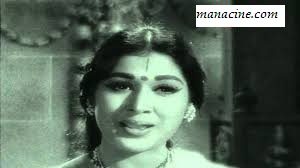 Molla is the second female Telugu poet of note, after Tallapaka Timmakka, wife of Annamacharya. She translated the Sanskrit Ramayana into Telugu.
Molla is the second female Telugu poet of note, after Tallapaka Timmakka, wife of Annamacharya. She translated the Sanskrit Ramayana into Telugu.
Her father Kesana was a potter of Gopavaram, a village in Badvel Mandal, fifty miles north of Kadapa in Andhra Pradesh state. He was a Saivaite and devotee of Srikantha Malleswara (an incarnation of Shiva) in Srisailam. He gave her daughter the name Molla, meaning “Jasmine”, a favourite flower of the god, and also nicknamed her Basavi in respect to Basaveswara (another incarnation of Shiva).
Molla claimed Lord Shiva as Guru, and her inspiration is claimed to have come from Potana, who wrote Bhagavata purana in Telugu. Like him, she was Saivaite, but wrote the story of Rama (an incarnation of Vishnu) and also refused to dedicate her Ramayana to any king, a general practice for poets at the time.
According to Varadarajn’s book, “Study of Vaishnava Literature”, as her popularity spread, she was invited to Sessions court and got an opportunity to recite Ramayana in front of Krishnadevaraya and his poets. She spent her old age at Srisailam in the presence of Lord Srikantha Malleswara.
Her work is known as Molla bhagavata and is still one of the simplest of many Ramayans written in Telugu.
She primarily used simple Telugu and only used Sanskrit words very rarely. Poets that had written earlier than her like Tikkana and Potana used Sanskrit words freely in their works.
She was humble and paid tribute to the earlier scholars who had written the Ramayana in her book. The opening poem says – “Ramayana had been written many times. Does someone stop taking food because it has been taken every day? So is the story of Rama and one can write, read and love it as many number of times as possible.”Additionally, she states that if a work is filled with words that reader cannot understand instantaneously, it would be like a dialogue between a deaf person and a dumb person. In other words, poetry should be intelligible to the reader as he reads along and without referring to dictionaries and/or consulting scholars. According to Molla, poetry should be like honey on the tongue—one should feel it as soon as the honey hits tongue.
She added fictional accounts to original stories and in some instances, removed some portions from the original story. Sanskrit-to-Telugu translation works from earlier poets like Tikkana followed the exact story sequences in the original work. She was contemporary to Srinatha and poets of the Vijayanagara Empire, who created Prabhandas which are known for adding fictions.Several critics have attested to her claim as valid. Her Ramayanam has been quoted as a work filled with native flavor, ease of diction and appealing to ordinary readers.
About the Director:
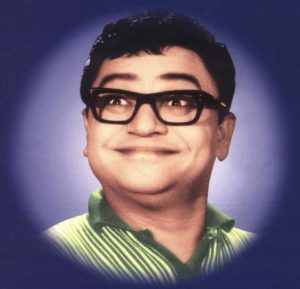 Basavaraju Venkata Padmanabha Rao (20 August 1931 – 20 February 2010), popularly known as Padmanabham, was an Indian film, character actor, comedian, director and producer known for his works predominantly in Telugu cinema.Padmanabham is regarded as one of the finest comic actors of India, noted particularly for his comic expressions, and dialogues during the golden age of Telugu cinema. Padmanabham was essentially a theatre artist, although he also found success in cinema, and has acted in over 400 feature films. He made his film debut in 1945 with Mayalokam. He co-founded a Theatre group with his friend Vallam Narasimha Rao, Rekha and Murali Arts with S. P. Kodandapani as their music director.
Basavaraju Venkata Padmanabha Rao (20 August 1931 – 20 February 2010), popularly known as Padmanabham, was an Indian film, character actor, comedian, director and producer known for his works predominantly in Telugu cinema.Padmanabham is regarded as one of the finest comic actors of India, noted particularly for his comic expressions, and dialogues during the golden age of Telugu cinema. Padmanabham was essentially a theatre artist, although he also found success in cinema, and has acted in over 400 feature films. He made his film debut in 1945 with Mayalokam. He co-founded a Theatre group with his friend Vallam Narasimha Rao, Rekha and Murali Arts with S. P. Kodandapani as their music director.
The veteran finds it hard to mention any particular comic role as his most memorable one, but makes a special mention of the role of a rickshaw puller that he played in Desoddhaarakudu (1975). “It had ample measure of ‘karuna rasa’ in it and I could display the other shade of my talent,” he says. The role became famous for the song ‘Aakalayyi Annamadigithe Pichchodannaru Naayaallu’. Padmanabham, who directed eightfilms in all, introduced S.P. Balasubrahmanyam to the film industry through Sri Sri Sri Maryada Ramanna. Kathanayika Molla, which he directed in 1969 fetched him the Nandi Award.
Songs:

